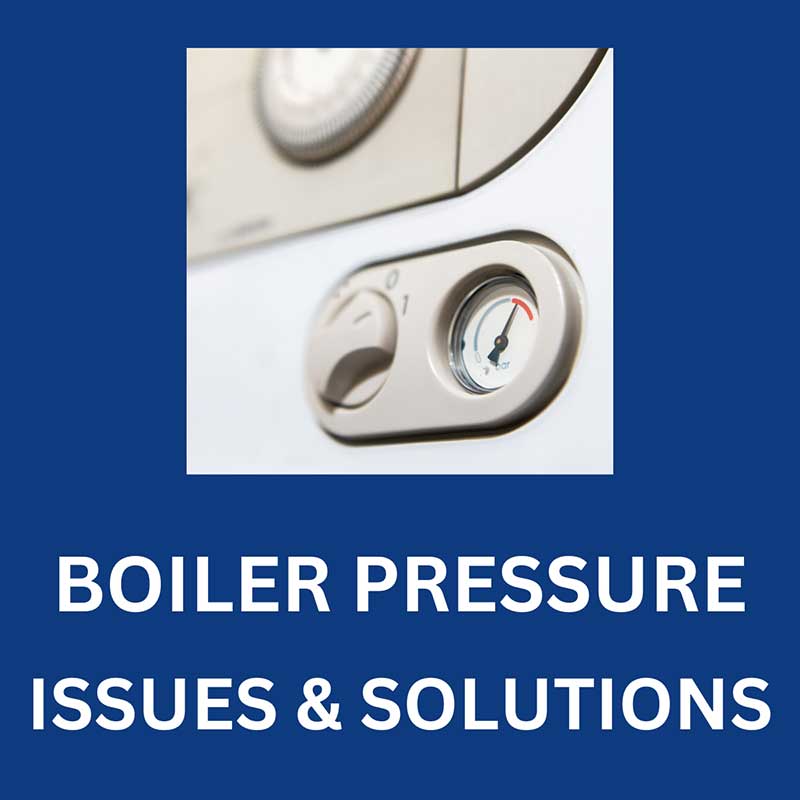
Maintaining optimal Boiler Pressure is essential for ensuring efficiency and safety in your home heating system.
When Boiler pressure rises above the recommended range, it can lead to leaks, which can damage your Boiler, heating system and home.
On the other hand, excessively low pressure will impair the system’s performance, resulting in suboptimal heating.
What Is Boiler Pressure?
Boiler pressure refers to the pressure of hot water within a system. It’s measured in units called bars or pounds per square inch (psi).
Maintaining the correct Boiler pressure is essential for efficient and safe system operation.
The correct pressure ensures that hot water or steam is effectively circulated throughout the system to provide heating while preventing potential issues such as leaks or system damage.
What’s The Ideal Boiler Pressure?
The ideal pressure levels vary depending on the type of Boiler but typically range between 1 and 2 bar.
For combination boilers, the ideal pressure is usually around 1.5 bar, while for system and heat-only boilers, it may be closer to 1 bar.
To establish the correct pressure for your Boiler, refer to your Boiler manual or ask your gas engineer.
What Type Of Boiler Do I Have?
Before you check your Boiler pressure, you must determine whether you have a combination, system, or heat-only Boiler. Then, you can look for certain key features or components that are unique to each type:
Combination (Combi) Boiler
- No separate hot water cylinder or cold water storage tank.
- Compact size, often wall-mounted.
- Check the Boiler’s label or user manual for the word “combi” or “combination.”
System Boiler
- Separate hot water storage cylinder, but no cold water storage tank.
- The hot water cylinder is usually located in an airing cupboard.
- The Boiler may be labelled as “system” or “sealed system” in the user manual or on the unit itself.
- The pressure gauge may be visible on the Boiler. If not, it will be near the cylinder close to a small red cylinder.
Heat-Only Boiler
- Separate hot water storage cylinder and cold water storage tank (typically found in the loft).
- The hot water cylinder is usually located in an airing cupboard.
- The Boiler may be labelled as “regular,” “conventional,” or “open vent” in the user manual or on the unit itself.
- An expansion tank (smaller than the cold water storage tank) may also be found in the loft, connected to the heating system.
How To Check Boiler Pressure
Once you have determined the type of Boiler, you have to check the pressure.
Combination Boiler
To check the pressure of a combination boiler, follow these steps:
- Locate the pressure gauge: The pressure gauge is usually found on the front of the Boiler, either as an analogue dial or a digital display. It measures the boiler pressure in units such as bars or pounds per square inch (psi).
- Read the pressure: Check the needle or digital reading on the gauge. A typical pressure for a combination boiler when the heating system is cold is around 1 to 1.5 bars. When the system is running and heated, the pressure may increase to around 2 bars. Remember that the optimal pressure may vary depending on the specific Boiler model, so consult your Boiler’s manual for the recommended pressure range.
System Or Heat Only Boiler
Checking the pressure of a system or heat-only Boiler involves a similar process. Here are the steps to follow:
- Locate the pressure gauge: The pressure gauge is typically found on the front of the Boiler or the pipework near the Boiler. It measures the boiler pressure in units such as bars or pounds per square inch (psi) and may come as an analogue dial or a digital display.
- Read the pressure: Observe the needle or digital reading on the gauge. The pressure should be around 1 to 1.5 bars for both system and heat-only boilers when the heating system is cold. When the system is running and heated, the pressure may increase to around 2 bars. Refer to your Boiler’s manual for your model’s specific recommended pressure range.
Remember that the boiler pressure should only be checked and adjusted when the system is cold, as the pressure will naturally increase when operating.
Always consult your Boiler’s manual for specific instructions and safety precautions, and if you are unsure or uncomfortable with the process, contact a professional heating engineer for assistance.
Low Boiler Pressure
Here are the causes and signs of low Boiler pressure
Causes Of Low Boiler Pressure
- Leaks in the system: One of the most common causes of low boiler pressure is a leak in the central heating system. Leaks can occur in pipes, radiators, or the Boiler itself, leading to a drop in pressure.
- Faulty pressure relief valve: A malfunctioning valve can release water from the system, reducing pressure.
- Radiator bleeding: When air becomes trapped in radiators, it may be necessary to bleed them. This process can temporarily reduce the boiler pressure.
Signs Of Low Boiler Pressure
- Heating inefficiency: Low pressure can cause your heating system to work less efficiently, taking longer to heat your home and using more energy.
- Boiler cutting out or not starting: Insufficient pressure may cause your Boiler to shut down or fail to start, leaving you without heating or hot water.
- Error codes on the display: Modern boilers often feature digital displays that show error codes when there is a problem with the system. Low pressure may trigger specific codes, alerting you to the issue.
High Boiler Pressure
Here are the causes and signs of low Boiler pressure
Causes Of High Boiler Pressure
- Overfilled system: If too much water is added to the system, the pressure can increase beyond the ideal range.
- Faulty expansion vessel: The expansion vessel is designed to absorb excess pressure as the water expands when heated. A faulty vessel can lead to increased pressure in the system.
- Malfunctioning pressure relief valve: If the pressure relief valve fails to release excess pressure, the boiler pressure may rise to dangerous levels.
Signs Of High Boiler Pressure
- Noisy boiler operation: High pressure can cause your Boiler to operate more loudly than usual, with gurgling or banging noises often a sign of a problem.
- Leaking around the pressure relief valve: If the pressure relief valve is not functioning correctly, water may leak from the valve as the system tries to release excess pressure.
- Error codes on the display: As with low pressure, high pressure can trigger specific error codes on your Boiler’s digital display, indicating an issue that requires attention.
Solutions To Boiler Pressure Issues
Here are some solutions to fix low and high Boiler pressure
Fixing Low Boiler Pressure
- Checking for leaks: Inspect your central heating system for any visible leaks, paying close attention to pipes, radiators, and the Boiler itself. If you identify a leak, calling a Gas Safe registered engineer is essential to fix the issue.
- Re-pressurising the system: If there are no leaks and the pressure is still low, you can try re-pressurising the system. Consult your boiler manual for instructions, as the process can vary between models.
- Replacing a faulty pressure relief valve: If the pressure relief valve is not functioning correctly, it may need to be replaced by a professional engineer.
Fixing High Boiler Pressure
- Releasing excess water from the system: If your Boiler’s pressure is too high, you may need to release some water from the system. Depending on your boiler model, this can typically be done using the drain point or the filling loop. Consult your boiler manual for specific instructions, or consult a gas engineer.
- Replacing or recharging the expansion vessel: If the expansion vessel is faulty, it may need to be replaced or recharged. A Gas Safe registered engineer should do this, as the process can be complex and potentially dangerous if not carried out correctly.
- Replacing a faulty pressure relief valve: As with low pressure, a faulty pressure relief valve can cause high boiler pressure. If this is the case, the valve will need to be replaced by a professional engineer.
Need Help With Your Boiler Pressure?
If you’re having trouble with Boiler pressure, live in the Essex area and need assistance, please Contact Us. We have a team of Gas Safe Registered engineers who operate throughout Essex and will quickly resolve any Boiler or heating-related issues you’re experiencing.

Hi, I’m Terry, the founder and owner of TM Hughes & Son Gas Services
Please get in touch to book an appointment or receive a free, no-obligation quote
Call – 01245 830075
Email – info@tmhughesandson.uk
0% Finance
For Boiler Installations & Repair
